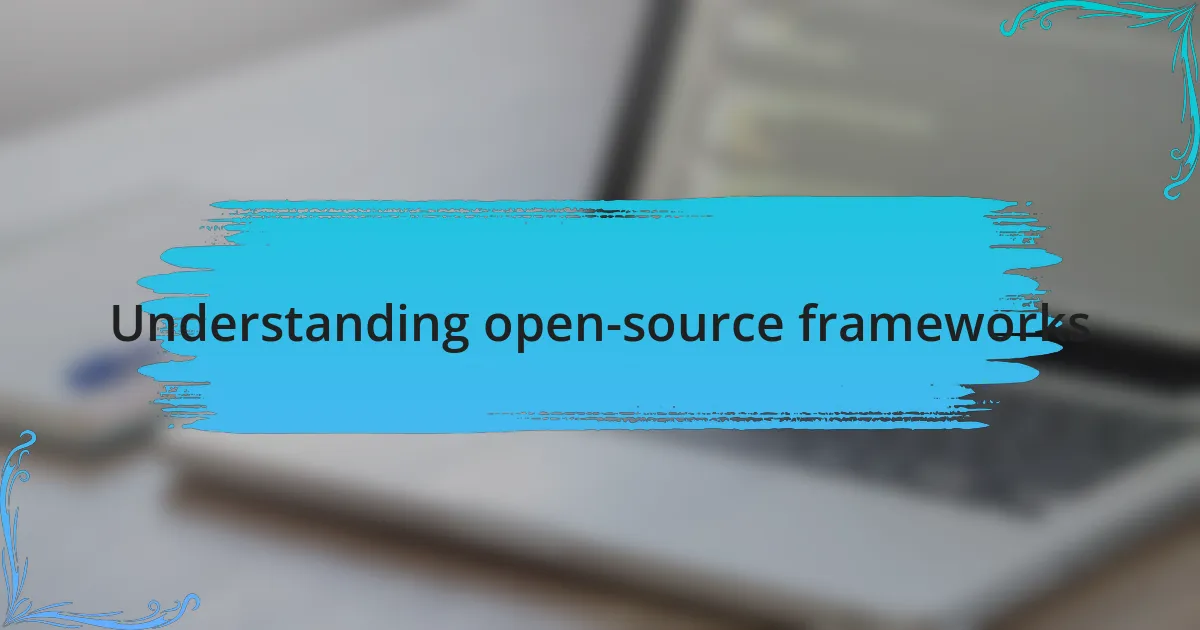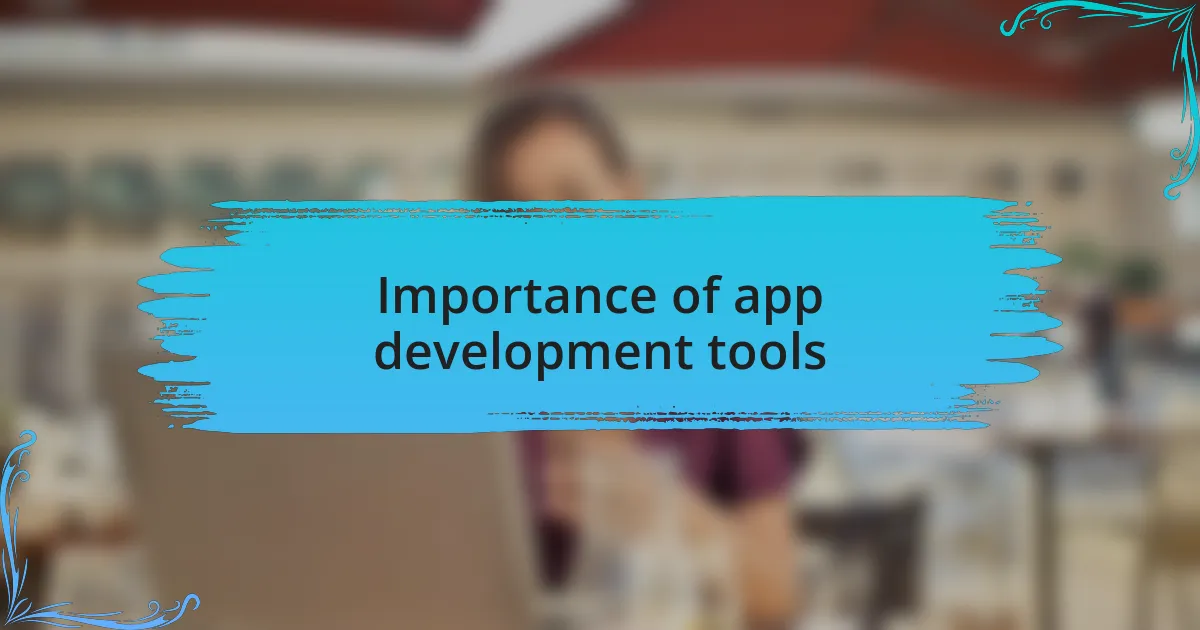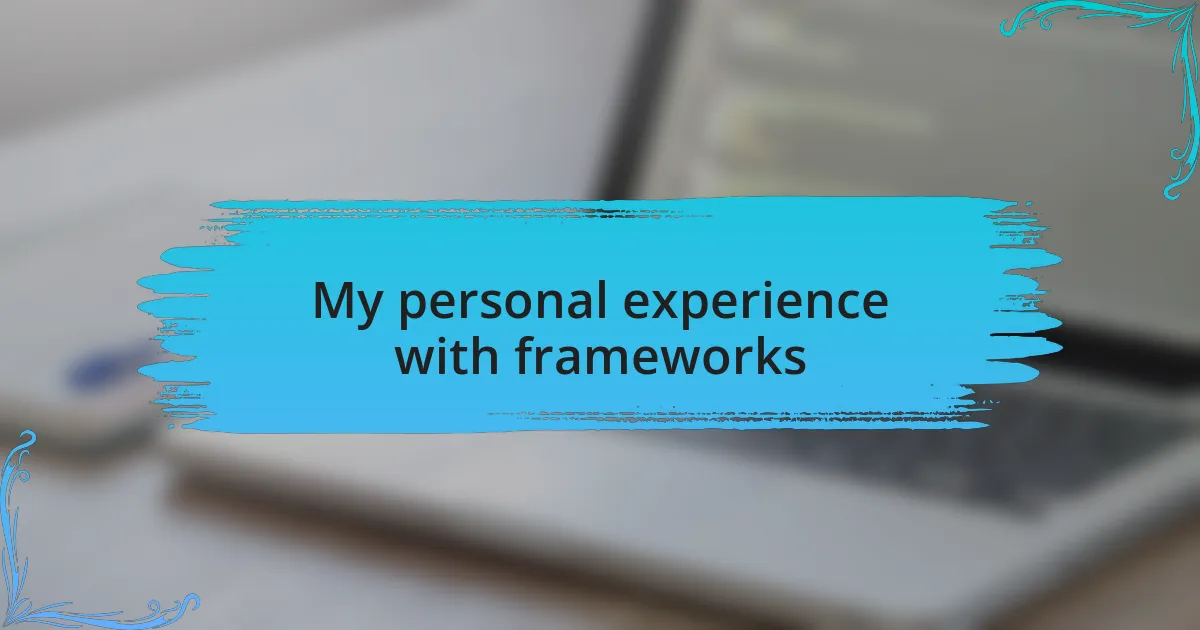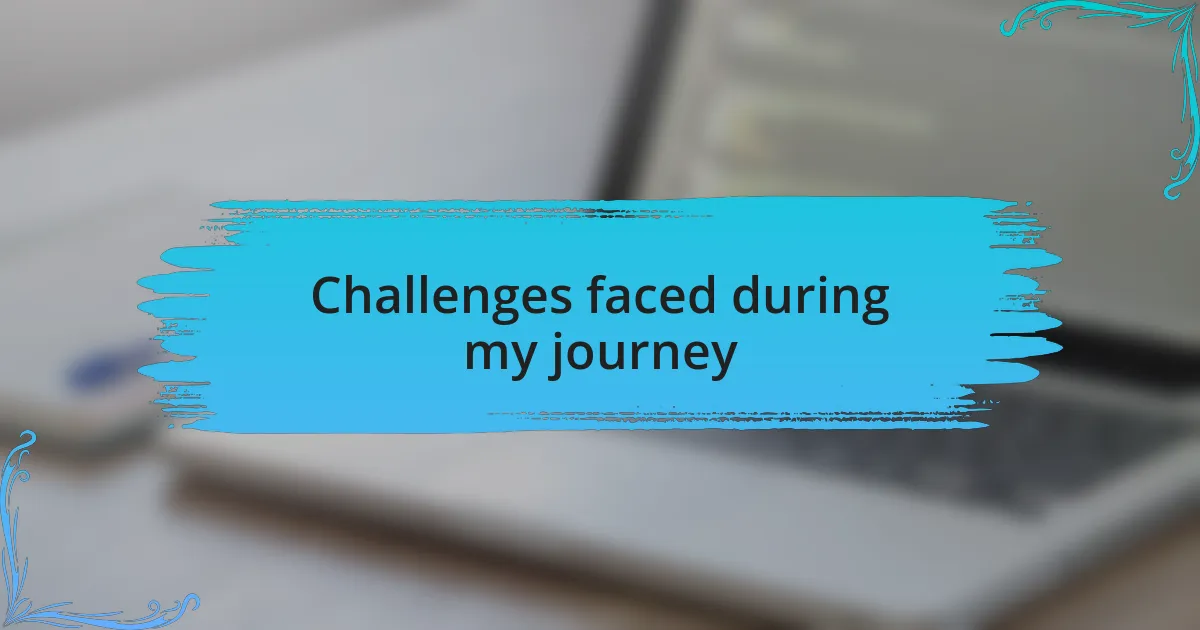Key takeaways:
- Open-source frameworks foster a collaborative environment, enhancing both technical skills and personal growth through community support.
- Choosing the right development tools significantly improves efficiency, collaboration, and quality control in app development.
- Practical experiences with various frameworks, such as Ruby on Rails and React, highlight the importance of adaptability and continuous learning in technology.
- Challenges in using frameworks, such as documentation issues and complex scaling, serve as essential learning opportunities that sharpen problem-solving skills.

Understanding open-source frameworks
Open-source frameworks are essentially collaborative platforms where developers share code, allowing anyone to modify and enhance it. When I first dipped my toes into open-source projects, I was struck by how empowering it felt to contribute to something larger than myself. It made me reflect: how often do we get the chance to create and innovate alongside global talent?
These frameworks often come with vibrant communities that drive continuous improvements and provide support. I remember feeling overwhelmed at first, navigating forums filled with experienced developers. But through persistence and asking questions, I discovered a wealth of information and camaraderie that turned my initial confusion into confidence. Have you ever experienced that moment where suddenly everything clicks into place? It’s incredibly rewarding.
Another compelling aspect of open-source frameworks is the learning opportunities they offer. Like many, I made mistakes along the way, but those missteps became some of my best lessons. They taught me not only technical skills but also the importance of collaboration. Isn’t it fascinating how setbacks can lead to growth, especially when surrounded by like-minded individuals who are also on their journey?

Importance of app development tools
Every app development journey hinges on the right tools. I’ve learned that choosing the right development tools can make the difference between a smooth sail and a rough, turbulent sea. When I first switched to using modern development tools, I found the efficiency remarkable; tasks that once took hours were completed in mere minutes. Have you ever experienced that “aha” moment when everything falls into place because of the right tool?
Moreover, these tools enhance collaboration among team members. I recall a project where using a centralized platform allowed my team and me to communicate in real time, speeding up our development process significantly. It was fascinating to see how a simple feature like integrated chat made feedback loops faster and transformed our dynamic. Do you ever think about how much more productive teams could be with better tools at their disposal?
Lastly, the relevance of app development tools cannot be overstated when it comes to maintaining quality and security in apps. I once faced a major setback due to a security flaw that slipped through the cracks because I wasn’t using robust tools. It’s a stark reminder: we must utilize the best resources to ensure our apps run safely and smoothly. Isn’t it interesting how the right set of tools can turn potential disasters into mere speed bumps on the road to success?

Popular open-source frameworks overview
Open-source frameworks have dramatically reshaped how we approach app development. For instance, frameworks like React and Angular have given me the tools to create dynamic user interfaces with ease. Every time I dive into a new project with these frameworks, I find that their large community support leads to readily available solutions, making problem-solving feel like a collaborative effort rather than a solitary task.
While exploring various frameworks, I discovered that Django and Ruby on Rails stand out for backend development. Their extensive libraries and built-in functionalities often cut down the amount of boilerplate code I need to write. I remember the first time I built a web application with Django, and it felt like the framework was guiding my hands—it’s a blend of simplicity and power that stays with me.
Another noteworthy mention is Flutter, which has captured my interest for cross-platform app development. With its capability to provide a native-like experience on both iOS and Android, I felt empowered to target a broader audience without compromising on performance. Have you ever started on a project and wished you could share it across platforms with equal ease? Flutter made that dream a reality for me, and the excitement of reaching users on diverse devices has been immensely fulfilling.

My personal experience with frameworks
Jumping into the world of frameworks was like stepping into a new dimension of app development for me. I remember the first time I applied Vue.js on a side project; it felt like unlocking a secret door that led to simpler, cleaner code. The joy I felt when my user interactions became seamless was truly something I couldn’t have anticipated.
One of the standout moments in my journey was when I utilized Ruby on Rails to build an e-learning platform. The framework’s convention over configuration approach reduced my decision fatigue significantly. I can still recall the surge of excitement when I realized I could set up a database in minutes instead of hours—it’s like being given a magic wand to accelerate my development process.
Have you ever faced the daunting task of debugging? I certainly have, especially when working with complex frameworks. However, my experience with Angular taught me resilience. I recall one particular bug that stumped me for hours. It was through exploring the vibrant community forums that I discovered a simple solution. That moment not only reinforced my love for Angular but also highlighted how frameworks foster a sense of community and collaborative problem-solving.

Challenges faced during my journey
Diving into open-source frameworks presented a few hurdles I hadn’t anticipated. I vividly recall the frustration of diving headfirst into a new library without adequate documentation. There’s nothing quite as disheartening as spending hours trying to implement a feature only to realize the instructions were ambiguous at best. Have you ever felt that sinking feeling of helplessness? I certainly have, but it was through those challenges that I grew more resourceful and learned to seek out community support.
Then there was the time I decided to scale an application built with Django. It was exciting at first, but as my codebase grew, so did the complexity. Keeping track of various dependencies became a juggling act. I remember feeling overwhelmed, wondering if I had bitten off more than I could chew. It made me appreciate the importance of thorough planning and robust project structure, factors I had initially overlooked.
Finally, integrating different tools and libraries often felt like running a gauntlet. I encountered conflicting versions and sleepless nights trying to resolve compatibility issues. It was both taxing and enlightening. I still think back to those late nights battling with package managers, feeling like an old warrior in a digital battlefield. Looking back, I now view those challenges as essential stepping stones that helped sharpen my skills and deepen my understanding of the intricate landscape of app development.

Lessons learned from using frameworks
One of the biggest lessons I learned from using open-source frameworks is the value of community engagement. I remember feeling lost in the weeds while trying to troubleshoot a particularly stubborn bug with Laravel. It was through engaging in online forums and communities that I found not just solutions, but a network of like-minded developers who were eager to help. It made me realize that the open-source world thrives on collaboration and shared knowledge, which is something I now actively participate in.
Another important takeaway is the necessity of continuous learning. When I first experimented with React, I underestimated how quickly things could change in the ecosystem. Each new version brought fresh features and best practices that I needed to grasp. Have you ever felt overwhelmed by the pace of technology? I certainly have. This taught me that flexibility and a commitment to staying updated are not just beneficial, but essential for any developer wanting to thrive in this landscape.
Lastly, I discovered that experimentation fosters creativity. There were times when I would push the boundaries of what was possible with Flask, trying out unconventional features. Some of my attempts ended in failure, but those missteps often led to unexpected insights and innovative solutions. It dawned on me that taking risks—even if they don’t always pan out—can lead to profound personal and professional growth in app development. Isn’t that how we discover our true potential?